It should go without saying that any group identifying itself as an “urbanist forum” should be expected to hold core values surrounding diversity, free expression and openness to difference. These things are the bedrock of both city life and any public debate of substance. Not, apparently, for our Lexington Urbanist Forum.
I was reminded of this early last month when checking in on what the FaceBook group of local urbanists was up to. As it turns out, the open-minded group had just finished banning Lexington resident and District 04 city council candidate Barry Saturday from participating in their group online forum, seemingly over a comment Saturday made regarding why the vast majority of Lexington residents do not use LexTran.
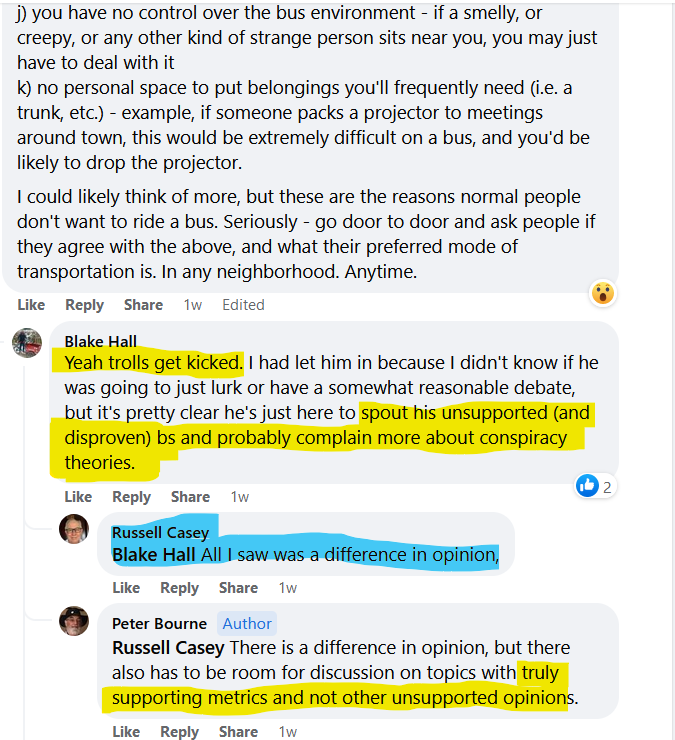
Officially, Saturday’s bannable offense, according to LUF content moderators Blake Hall and Peter Bourne, was because he was a complaining “troll” who holds views that are “unsupported,” “(disproven) BS,” “conspiracy theories” that lack in “metrics.”
In reality, of course, Saturday just held a dissenting opinion, and so his views and personhood were quickly trashed and then banned by a collection of Lexington urbanists who operate much like suburban mall operators. As readers will see below in the first part of this North of Center interview with Saturday, our urbanist forum members were being both disingenuous and anti-community in so carelessly labeling the man’s work and views as outside the realm of community discussion and debate.
Saturday is at least the second person banned from contributing to the Forum. I have unsuccessfully attempted for two years to post there, too. Officially, as I have come to found out, the reason for my ban owed to my dozen+ years covering the city–a history that includes, among other things, writings on the Town Branch and Legacy Trails, a 2014 campaign for Lexington Mayor that front-loaded funding for LexTran and greenway trails, and a mini youtube series covering the LexTran #7 line. Unlike other members of our city’s urbanist forum, apparently, this research, activist and publishing history bore so little relation to urbanist values that (unlike Saturday) I was pre-emptively banned.
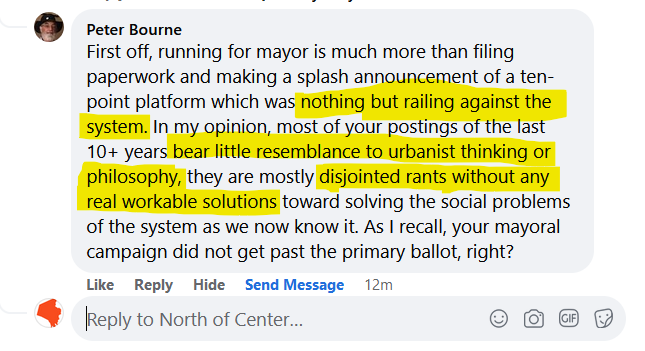
Since most urbanists wouldn’t be caught dead patronizing something as gauche as a suburban mall, let’s cut our city’s group some slack and liken them instead to something a bit more dignified and culturally on target: a private country club. Our very own 280-member Lexington Urbanist Country Club (LUCC).
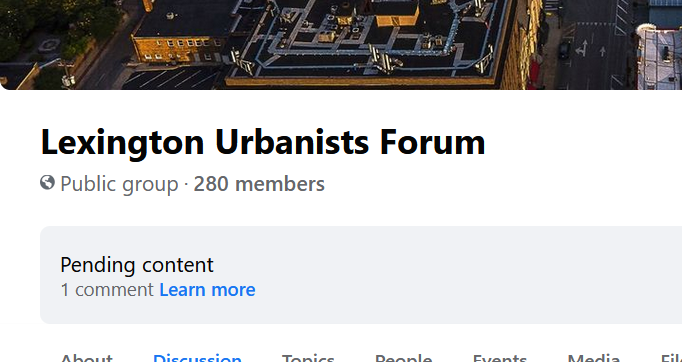
Caddyshack is a good orienting marker here. As LUCC leadership, Bourne and Hall are playing the classic Judge Elihu Smails and Dr. Beeper roles, characters whose job it is to keep the Club pure so that its posting members can continue to safely discuss Lexington’s urbanist future. IRL, these vetted posters include the kind of empowered people you might expect to find at any country club for urbanists: local politicians, area NGOs, developers, and select members of the local media.
Saturday and I–the hoi polloi barred from LUCC’s public-facing door–come at our city engagement from different perspectives, so we do not agree on many issues. I am engaged enough in this city, however, to know that his views are not “conspiracy” or “b.s.” to be banned outright as our LUCC gate-keepers proclaimed. On the contrary, Saturday has a published history of engaging city issues that are often unconventional and always honestly arrived at. Me, I’ll take that honest and unconventional engagement any day of the week over the highly-managed fairway grass of acceptable thought that passes for civic discourse in this city.
I guess this marks the two of us as the Rodney Dangerfield and Chevy Chase of the Lexington Urbanist Country Club, off-beat observers who threaten the sanctity of the “correct” way for city leaders to continue discussing this city’s future. Which one of us is Rodney Dangerfield? Which one a young Chevy Chase?
I’ll defer to readers on that one, but I hope you enjoy this 2-part interview as much as I did. Hopefully, Barry enjoyed the process, too, and we can have him back for another round of interviews in the future. Engagement–not knee jerk banning and lazy character assassination–is the key to a healthy community, something our city’s LUCC-managers seem oblivious to.
Danny Mayer, editor
***
NoC: You’ve got a lot of UK diplomas. Undergraduate ones in Economics and Spanish. Two Masters degrees, in Diplomacy and Secondary Teaching in Social Studies. What was your favorite social studies text or classroom lesson plan?
Barry Saturday: I regularly find myself intrigued by the unit I taught on Frederick Douglass. That guy is a true American hero. Came from less-than-nothing, and turned himself into a legendary figure in 19th century American politics. This is so improbable it should be shocking what a mentally tough individual he must have been. I would give students in my classes a copy of his autobiography to read and say you’re assigned the first chapter. Then I’d ask the classes if they wanted to keep reading, or jump into a different unit. Every time, they asked if they could keep reading. Tells you a lot about the power of Douglass as an historical and literary figure, and the inspiration his story provides to students facing their own challenges.
Additionally, I also have a passion for teaching about the Revolutionary War and George Washington’s influence on the new republic, from his military leadership to his Presidency. His impact on the world is, I think, underappreciated. Americans often think about him simply as another president, but he was far more than that and his contemporaries believed he alone ensured the success of a new form of government that, because of him, came to dominate the West. Ultimately, 1,000 years from now, I think they’ll talk about Washington alongside political and military dynamos that changed their era like Julius Caesar, Genghis Khan, and Napoleon.
NoC: You embrace many of the values of higher education, particularly civic engagement. You have run for city council, most recently this year for District 04 rep. Personally speaking, I know you as one of the few Fayette County citizens to take the time to contribute editorials to the Lexington Herald Leader. In 2021, you wrote an editorial in solidarity with Fayette County student Micheline Karenga, who had written her own op-ed calling upon FCPS to replace campus police with more school counselors.
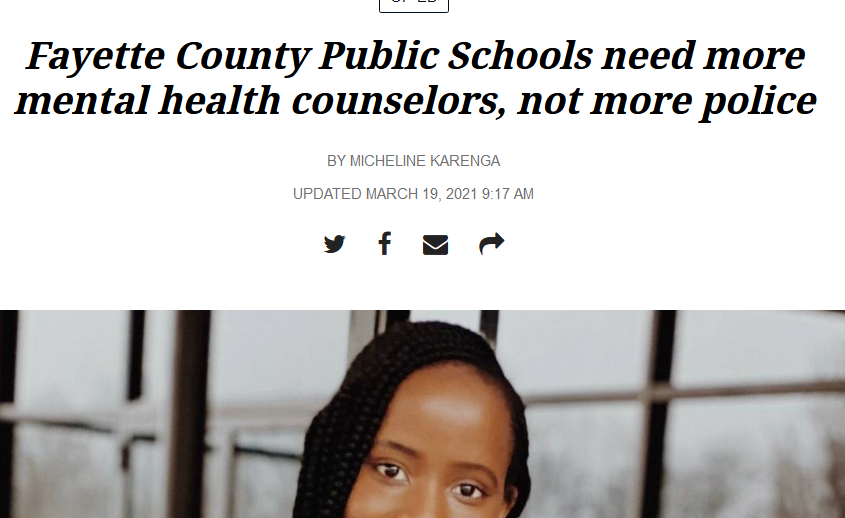
Later that year, you publicly bucked fellow Fayette County Republicans by voicing support for Lexington’s ban on No Knock warrants.
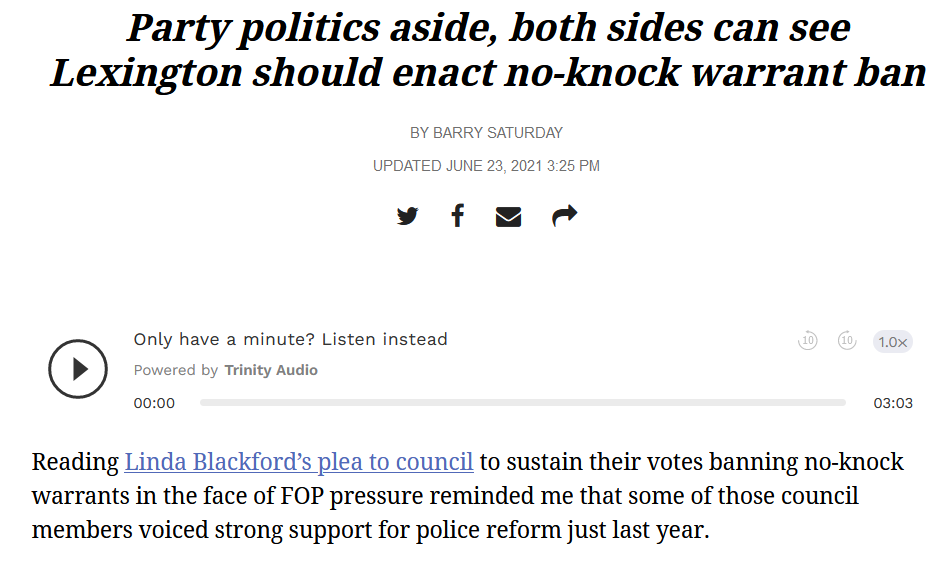
Both of your positions grew out of your personal experiences as a teacher. How so?
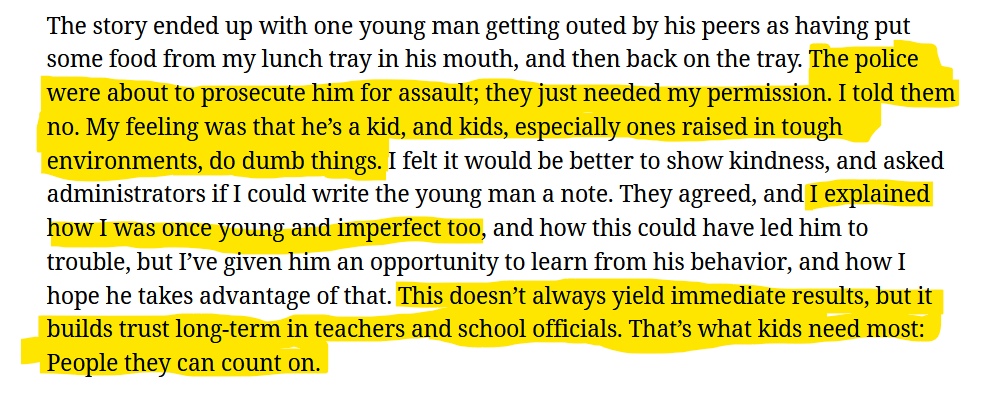
BS: While my experience in schools did definitely impact my column on the Counselors Over Cops discussion, it was not the entire basis of either that discussion or the Op-Ed on No-Knock warrants. In general, Constitutional principles and the societal value provided by our traditional aspirations of freedom are the genesis of both those views. The reason this nation has been so successful is our foundation based upon individual liberty – our freedom granted to the individual. The ability to succeed or fail on our own merits forces us to make better choices, and rewards us when we do. The more government hews to this philosophy, the more successful we become as a people. We’re starting to lose our freedoms, and we’re seeing significant problems as a result.
With law enforcement, Americans forget that when we call the police, we are acknowledging that all the better, more humane options to solve the problem have failed or in some cases, not even been attempted. Whether it’s a student who plays an unwise prank like I discussed in the Counselors Over Cops op-ed, or the need to ban no-knock warrants in the other, both situations require a wise, just government to resolve effectively. Government is always and everywhere one of the necessary evils of modern life. Making it less bad, or even an actual public “good” takes near superhuman powers and judgment.
Anyone interacting with the government should ideally have the expectation that the government will improve their lives and help them make better choices. Unfortunately, government actors (employees and elected leaders) don’t usually consider what’s best for the individual. They typically use the mindset provided by the culture of the government entity they belong to, whether it’s teachers or the police, a political party, or another agency. This is where culture is critical, and when government cultures get out of whack, it is imperative that citizens utilize the democracy available to them to fix the cultures.
As a teacher in public school, I was a part of the government, just like the police. In the situation described in my Counselors Over Cops op-ed, I used my judgment to ensure a kid was humanely taught a lesson, not thrown in jail. It would certainly have been easier on my ego to just tell the cops to throw the book at him. But that would have been wrong, because though I might perceive it would benefit me to do so, it would have unnecessarily removed a student’s freedom, and would thereby damage society.
No Knock warrants are similar. They remove the freedom and safety people perceive their homes to provide them. Any time power is given to the government, freedom is removed from the people. No knock warrants have proven themselves to be dangerous and psychologically devastating. Police are receiving frightening tools from intelligence they can use to harass and even torture Americans. The more we give away our freedoms, the more dependent upon the system we become, and the easier it is for the police to intimidate or socially exclude those they decide to target.
NoC: The No-Knock editorial was unkind to the anti-democratic way that Fayette’s Republican Party leaders pushed through their resolution to support No Knock warrants.
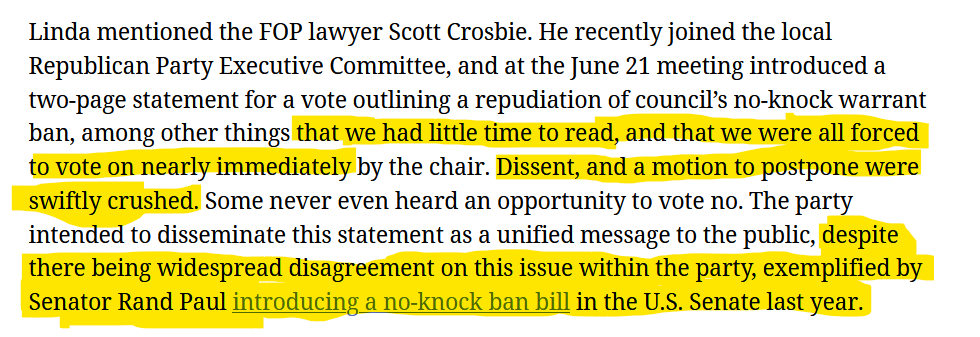
You are a Republican. How were these editorials received by the Republican Party political apparatus? Was that reception different among less connected Republicans–the Woodford on the street, as it were? How about in your recent canvassing, where you met a more diverse set of political affiliations?
BS: Did the GOP rank-and-file respond differently than the local leadership to my Op-Eds? Without a doubt. Anyone who values civil rights, which I would say is fundamental to traditional Republican values, is open to the conversation, particularly gun owners who fear the very situation that happened to Amir Locke, the musician who was shocked out of his slumber by people knocking down the door. He groggily picked up his gun to aim at the intruders and was killed perhaps prior to even knowing it was police in his home.
NoC: Another of your 2021 editorials, opposing the Imagine Nicholasville Road study, criticizes its idea “to remove several car lanes on Nicholasville Road in order to install bus-only lanes they call Bus Rapid Transit. This means,” you state, that “car traffic there will be a disaster, and overflow will spill further into neighborhoods and onto Harrodsburg and Tates Creek Roads.”
Your opposition to Bus Rapid Transit along Nicholasville Road seems rooted in a larger critique you have with City Planning’s long-term goals to (1) increase urban density while at the same time to (2) preserve rural land (via the Urban Services Boundary). The consequences of pursuing these two goals, you write, is “altering neighborhoods to make them denser” and restricting “housing supply, caus[ing] home prices to go up.”
BS: Broadly my views were originally rooted in simple economics – when you intentionally limit housing supply in a growing city, this is going to cause housing problems. Then I researched other cities that were operating with American Planning Association-style Comprehensive Plans. In each situation, no matter the other factors about the city, each time cities saw increased traffic problems, gentrification, and housing crises.
Nashville’s Comprehensive Plan even attempts to mask the intended gentrification within its summary by using ridiculously complex wording. See bullet 5, highlighted below.
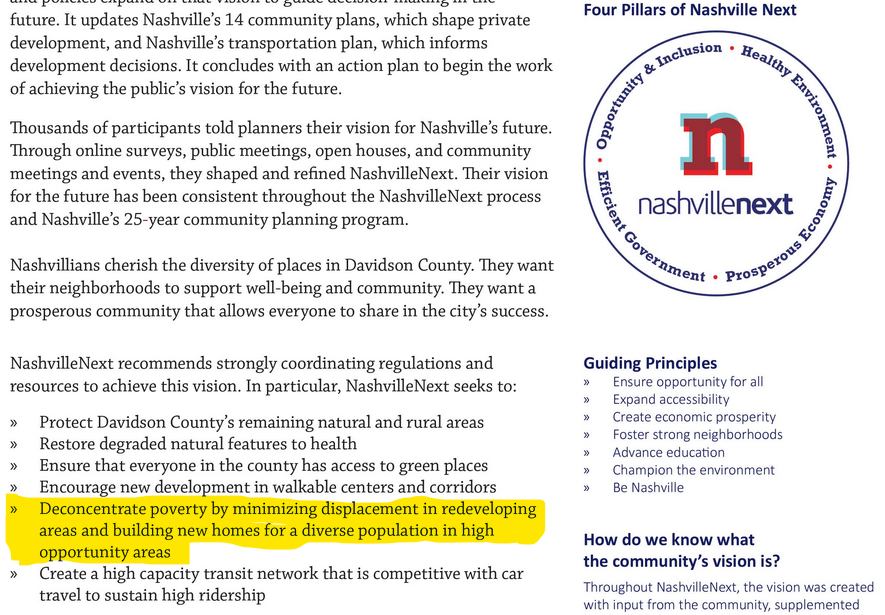
When you have to hide your public policy intentions, it’s pretty safe to assume what you’re doing is wrong.
These things seem similar to arguments that a group like Lexington for Everyone is making now, a year later (and a bit more blandly). Would you agree, or do you see differences between your views and Lexington for Everyone?

BS: Ha, I appreciate the compliment that my work can be a bit more colorful than others’. Regarding Lexington for Everyone, I was glad to see this new group emerge, as they seemed to share my philosophy, nearly to the letter. We are both rooted in basic economics.
My only concern, however, if it is indeed controlled by Commerce Lexington, I think they should make that clear in all their publications. Otherwise, they run into a potential trust problem, particularly as it seems targeted toward minorities’ interests. Urbanists are already attempting to label their opponents as over-friendly to minorities, so if it lacks authenticity, this could be a dangerous ploy that may backfire in ways that outlast the current iteration of the Comprehensive Plan.

Consequently, Commerce, if you’re listening, ensure everyone knows this is your project. Minorities have real concerns about the urbanist agenda, so engage with them. If you’re honest, they’ll back your play as it’s both the right thing, and in their interest to do so.
NoC: Your Nicholasville Road editorial sparked what passes for a debate in the Herald Leader op-ed pages. Lexington urbanist Blake Hall composed a response editorial in which he claimed that your views promote sprawl. Hall makes 3 arguments: (1) allowing duplexes, fourplexes, and ADU’s in established neighborhoods will better address Lexington’s affordable housing issues; (2) development outside the current USB will increase car traffic; and (3) “[t]here is simply not enough space to build enough lanes to allow every commuter to drive by themselves in a timely manner.”
Hall’s views also seem rooted in issues of individual freedom. If a resident on a .5 acre lot wants to subdivide for a four-plex, thereby increasing the value of that property, then why restrict that freedom? (Even if it might devalue a neighbor’s individual property.) Or the development of the USB, which will impinge on the freedom of the horse-farmer next door? Or the freedom to live without a car and its non-insignificant attendant costs.
Are there distinctions in types or categories of individual freedom, or in how they are achieved?
BS: One of the problems with Hall’s response is that he attempts to have it both ways. The Comprehensive Plan is supposed to, according to its verbiage, respect the integrity of neighborhoods. At the same time, it ignores even universal opposition from neighborhoods as we saw in Glendover in 2018. This is the problem Hall and other urbanists have, as the vast majority of their stances on issues is intended to mislead readers.
The Nashville Comp Plan, which attempts to hide gentrification language, is a perfect example. As they’ll tell you themselves, their planning is based on “national best practices.” As they are promoting planning ideas from the American Planning Association, it is certainly national, though it would be strange to call it “best practices,” as every instance where this is implemented leads to housing crises, gentrification, snarled traffic, and worse, residents moving out of county and then commuting longer distances contributing to even more traffic. Yet they never admit these failures, or the human problems they create.
This brings up an important point. These APA urbanists clearly couldn’t care less about people. Not only do they ignore the problems and failures of their plans, they refuse to acknowledge the relevance of any contrary opinions (you’ve experienced this yourself), and worse, they don’t appear to have any empathy whatsoever. Case in point: Peter Bourne, one of the primary posters on the Urbanist Forum site. After the Mayfield, Kentucky tornadoes devastated that town, Peter posted on the site. Rather than offering sympathy or even regretting historical losses of architecture which would be relevant to the site, he said something that shocked even one of their own commenters:
“As an urbanist and a historian, what saddens me the most, when I see images like this, is the knowledge that what replaces all this destruction will be suburban style schlock.”
So despite the deaths and human tragedies and the difficult lives ahead for the people of Mayfield, Peter’s primary concern is inanimate buildings. A commenter on Peter’s own forum stated:
If what they rebuild with saddens you more than what those people have gone through, then your priorities are seriously f*****.
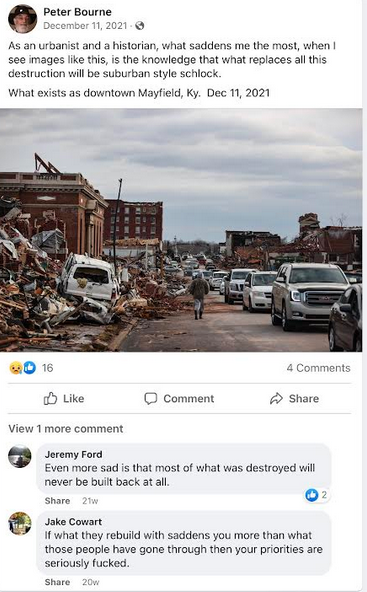
***
In part 2 of this interview, Saturday discusses his thoughts on Lexington busing and being banned by the Lexington Urbanist Forum Country Club.

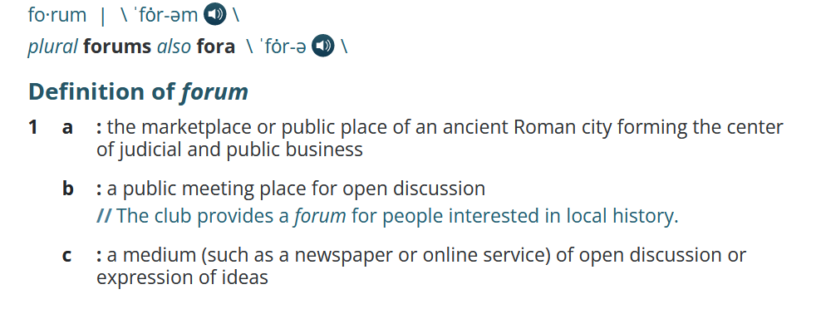

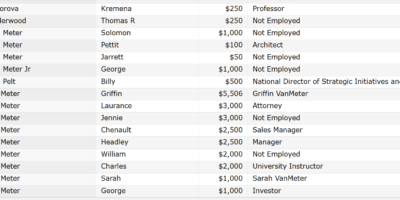

Duke Bradford
Where does attempting to overthrow the federal government fall on the “urbanist” scale?
Danny Mayer
Notice how you read a thing. You had a comment for a thing. You posted your comment for that thing. And then I published it, even if your thing was a petty and off-topic ad hominem attack on our interviewee.
That’s how a forum works. It’s a space where what you say gets to stand for itself for others to observe.
Barry Saturday
Peter Bourne says: “The greater tragedy” for Mayfield is that they “lost their small town feel”.
Not the deaths of loved ones, not the human suffering, not the challenges of rebuilding all their lives.
Peter, “buddy”, you may want to actually talk to real humans once in a while. You know, for variety.
Peter Bourne
I don’t know on what basis you assume that I don’t speak to “real” humans or the frequency with which I do, but I can say that I have never been asked to exit a dialogue intended for civic engagement.
The concerns I have for Mayfield (and other Kentucky communities) goes far beyond the short term solutions based on “thoughts and prayers.”
Peter Bourne
Yes, I do see that. I posted an opinion, although an expanded version of one I had posted elsewhere that some had mis-characterized as callous in their eyes. I did not bring voluminous documentation to make my point nor did I rely on my past writings to cast aspersions on any one connected with the destruction of a small rural community. I chose not to question why my previous comment was perceived as callous or go to great lengths to elaborate my opinion is the right one to have.
This is how I see a forum working on social media.
Peter Bourne
The both of you have misread my primary concern for the community of Mayfield. Yes, the small town in Western Kentucky did see a high death toll from the storms and I do feel for them. The greater tragedy is that this small community has lost its small town feel for those who will be doing the rebuilding over the next decades if they follow the paths set by West Liberty and Brandenburg. The once interesting downtown streets of retail shops and family owned dining places will in all likelihood take on the appearance of a lifestyle center such a s our own Summitt complex at Nicholasville and Man o’ War, complete with the short cycling of leases as businesses come and go with the rhythm of the fads and the economy.
Already the pandemic induced shortages in the supply chain and the loss of employment of its destroyed one major industry are leaving an impact on the community which will be hard from which to rebound. Mayfield, which grew quite organically from its beginnings will now be rebuilt per a regimented pro forma quite different from what made it what it was.
P.S. I have no control what happens on the Forum. I just post there.
Danny Mayer
Notice how you read a thing. You had a comment for a thing. And you posted your thing.
That’s how a forum works.